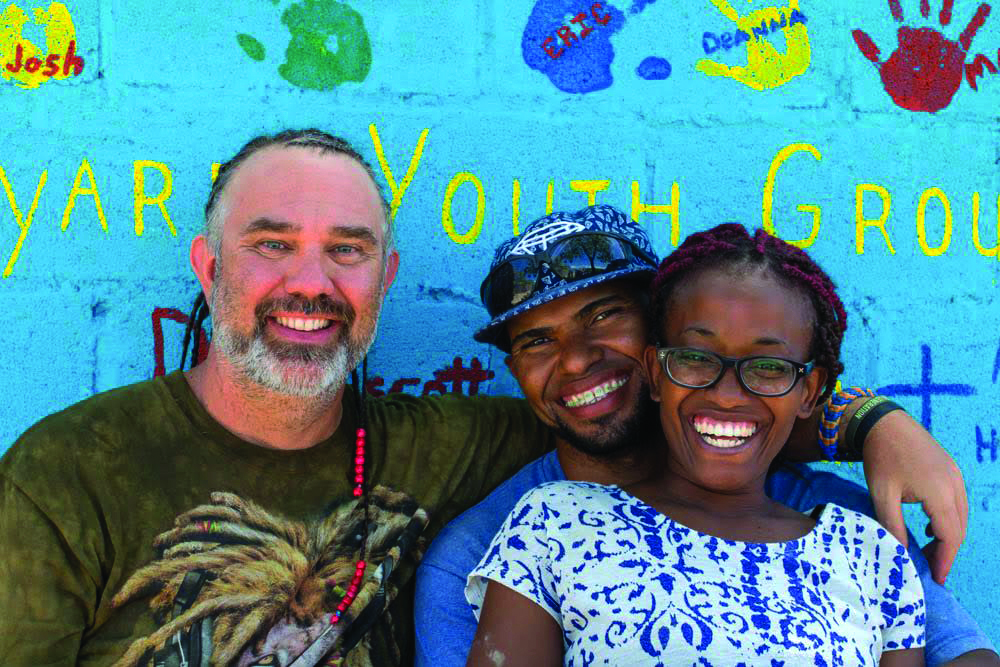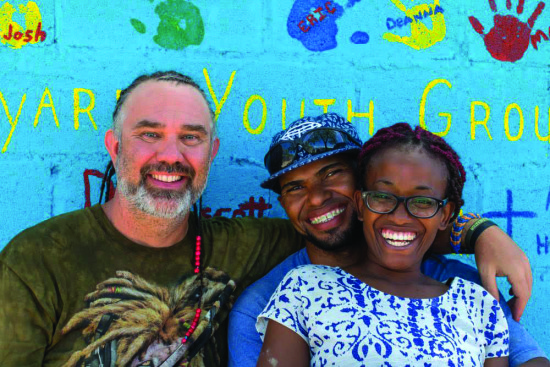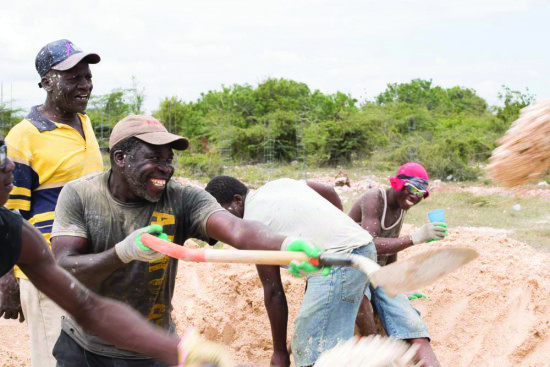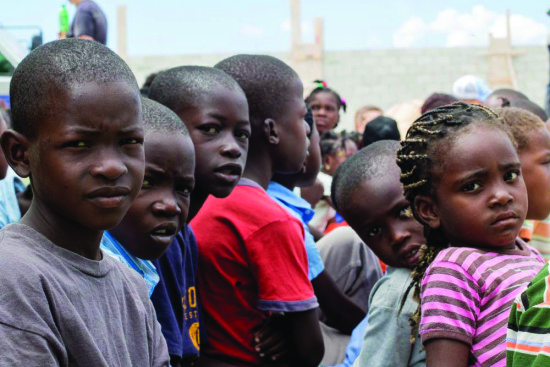
Viewpoint and photos by Chris Urquia
 6:30pm rolled around, and 11 members of the Sequim Vineyard Youthgroup departed from the Sequim Valley Foursquare Church on March 22nd. 11 daring souls, Sean Clift, Mary Lu Clift, Deanna Anderson, Karina Thiemke, Erica Bower, Joshua Vogel, Geraldine Stockmann, Jesse Francis, Oliver Lawrence, Eric Haynes, and myself (Chris Urquia), were donning cat-covered tie-die team shirts, loading suitcases, and packing more faith than the size of a mustard seed. After two flights, a bus ride, twenty-four hours and approximately 3,550 miles of travel, we found ourselves in Barahona, Dominican Republic, at the Las Altus Hotel.
6:30pm rolled around, and 11 members of the Sequim Vineyard Youthgroup departed from the Sequim Valley Foursquare Church on March 22nd. 11 daring souls, Sean Clift, Mary Lu Clift, Deanna Anderson, Karina Thiemke, Erica Bower, Joshua Vogel, Geraldine Stockmann, Jesse Francis, Oliver Lawrence, Eric Haynes, and myself (Chris Urquia), were donning cat-covered tie-die team shirts, loading suitcases, and packing more faith than the size of a mustard seed. After two flights, a bus ride, twenty-four hours and approximately 3,550 miles of travel, we found ourselves in Barahona, Dominican Republic, at the Las Altus Hotel.
Like most mission teams going out into the field, they go where they are called, or where the organization they are working with decides to send them. In our case, our youthgroup has felt a strong call to the people of the Dominican Republic. More specifically, the people in the poverty-stricken Bataiys of Barahona[1]
 However, unlike most teams, we traveled independent from any larger group or organization. We bore no flag of allegiance to any organization. Ours, instead, was the flag of hope and love, and that was for all people.
However, unlike most teams, we traveled independent from any larger group or organization. We bore no flag of allegiance to any organization. Ours, instead, was the flag of hope and love, and that was for all people.
Upon our arrival, we connected with the Paradys Family. Mecky, his wife Kenisha, and three sons, Joseph, Macias, and Jeremiah. The Paradys’ were the people we would be working alongside of. They are the coordinators of Eden Christian Center La Montanita, Barahona, Dominican Republic.
The Eden Christian Center serves to educate and teach the Bible to children and provide the children with their two meals a day.
La Montanita is one of the Bataiys of Barahona, and just like the others, it is equally as poor. Over the past year, the school has suffered a barrage of break-ins and theft. As a result, Mecky and Kenisha have been forced to close the school and make repairs and purchase more food for their students.
Fifteen years ago to present, it has been their unwavering dream to see a wall built around the school.
Now, in 2016, we came to build that wall. And we had just under two weeks to make it happen.
Post arrival, we started construction. When Kenisha had described the project to Sean, I don’t think he had realized just large of a project it was. “Initially, I thought we were going to construct a 15ft high, 100ft long wall. When we got to the school and saw the 3×4, hand-dug through bedrock trenches that measured out to a quarter of a mile, my mind exploded. We didn’t come prepared for 9,500sq. ft. of wall,” said Sean.
We went at it though. Sean had called it a “David and Goliath” scenario. It was nothing short of a giant. Literally.
 The work consisted of hand mixing concrete, unloading and laying bricks in the foundation, pick and shovel work, and carrying buckets of concrete to what would one day be the wall, we hoped. It wasn’t the easiest of jobs, and it wasn’t the hardest of jobs. We had our moments.
The work consisted of hand mixing concrete, unloading and laying bricks in the foundation, pick and shovel work, and carrying buckets of concrete to what would one day be the wall, we hoped. It wasn’t the easiest of jobs, and it wasn’t the hardest of jobs. We had our moments.
The construction of the wall also had good repercussions to members of the Bataiys and to others in the community. Men who needed to provide for their wives and children, who would otherwise be struggling to find work and keep food on the table, were making money and feeling productive once again.
As the first day of work came to an end, Kenisha Paradys said, “Todays progress is fabulous! When you see something more than just people’s work, it’s exciting. I’m definitely optimistic about the days ahead. Today itself was an obstacle. We don’t have the money, and we don’t have the manpower. But five months ago, we purchased a brick for each member of our family, and our friends did the same. But look, here we are. The wall is going up, and that is a miracle.”
Work continued, and I can’t say I was anywhere near as optimistic as Sean, the Paradys’ or any of our team members. To be honest, I didn’t think we were going to finish. I didn’t think we were going to come anywhere close to finishing the job. I thought we’d be fortunate to finish one side of the perimeter. I kept a journal, and in one entry, I wrote, “There is no way in hell that we’re going to finish the wall.”
When you’re doing everything by hand, under the hot sun, with 19 Dominicans and 11 “gringos” who’re suffering sunburns, blisters, heatstroke, and running off little to no sleep, the odds don’t appear to be in your favor.
“What are the odds that we finish this wall? At first, I would’ve said 1/1,000,000 and we’d only complete half of it. But we’re done. We finished it,” said Sean on our final day of work.
I’m still trying to wrap my mind around it still. We shouldn’t have finished, but we did. In fact, the Paradays’ had reached out for additional help, and a 30 person team from Canada is supposed to come down after we left. They were supposed to finish what we’d started. As it stands now, a 30 person cleanup crew is on standby.
Before the work began, Mecky was going to different contractors and comparing quotes. Originally, the entire project should have cost $45,000 (US dollars); however, after speaking to friends in the construction business, a new quote was made for $28,000, just above half of the original cost, and we finished with an excess of materials to boot.
Was it God and a miracle? Or was it hard work and coincidence? The Paradys’ will attribute everything to God. As for me, what really happened there is still in question. I can’t deny the fact that there was more going on than meets the eye. That much is for sure.
Mecky and Kenisha would say that everything that happened at Eden Christian Center is nothing short of a miracle. After all is said and done, we flew back home. However, due to delays, we spent the night in Miami, and caught another two flights from Miami to Denver, and from Denver to home. After roughly 40 hours of traveling, we found ourselves back in familiar Sequim. We’d seen people come together. People of Sequim and Port Angeles donated funds to support a mission thousands of miles from home. Thank you, all. Dominicans and Americans worked side by side as hermanos and hermanas – brothers and sisters. A difference was made in La Mantanita. None who were witness to what happened, none of us, will ever be the same. For those who know us or know of us, you’d know that we’re just a ragtag bunch of weirdos from the Pacific Northwest. But, as Julius Caesar once said, “Veni, vedi, vici.” Or as us gringos would say, “I came, I saw, I conquered.” That’s exactly what we did, or we played a small part in a much bigger plan. Who knows for sure? Let’s just leave it at that. Mission accomplished.
[1] Bataiy. A Bataiy is the term given to the villages inhabited by the decendants of Haitian laborers who worked the sugar cane plantations.Mission Impossible: Dominican Republic

Hopefully it servers the purpose they need it to.